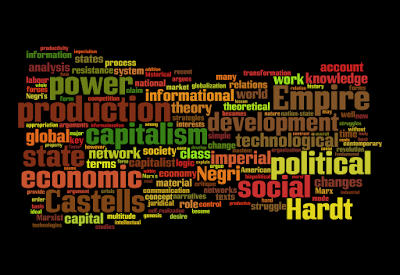THEORY BUILDING II: Rethinking Power/Empire
Required
Readings:
1. Hardt, Michael and
Negri, Antonio. “Preface” and “World
Order” in Empire. Harvard University Press.
2000. xi-22.
[click HERE]
NOTE: the book is shared; locate the right pages please~!
2. Iwabuchi,
Koichi. 2014. “De-Westernisation, Inter-Asian Referencing and beyond.” European Journal of Cultural
Studies 17 (1):
44–57.
[click HERE]
3. Larson, Neil. 2000.
“Imperialism, Colonialism, Postcolonialism”, in A Companion to Postcolonial Studies. Henry Schwarz & Sangeeta
Ray (Eds), Blackwell Publishing: 23-52 [click HERE]
supplementary readings:
1) For students who need to refresh their previous knowledge of postcolonialism, please download this entry HERE
Bill Ashcroft. Postcolonialism, The Wiley-Blackwell Encyclopedia of Globalization. Ed. George Ritzer. Vol. 4. Wiley-Blackwell Encyclopedias in Social Science Chichester, UK: Wiley-Blackwell, 2012. p1680-1683.
2) For "nation-state", please read here
Shay Hershkovitz, Nation-State, The Wiley-Blackwell Encyclopedia of Globalization. Ed. George Ritzer. Vol. 3. Wiley-Blackwell Encyclopedias in Social Science Chichester, UK: Wiley-Blackwell, 2012. p1492-1496.
NOTE:
I think we should prioritize reading No. 1 & No.3 (which does not mean that Iwabuchi is less important...)
Questions for Reading 1
1) for the preface, why we have to approach this "new global form of sovereignty" known as "Empire" by turning to discussions of nation-states (and their declining sovereignty)?
2. ) Why we should not confuse Empire with "imperialism"? How to understand the claim that "Imperialism is over" (xiv)? (we shall return to this in the opening chapter as well).
In a 2016 interview, Hardt points out that, "We started the project with the idea that anti-Americanism, meaning anti-U.S., is no longer adequate as a foundation for politics on the left..." and "it means that the US is no longer capable of shaping the global environment". What do you think?
3) Although only briefly mentioned, what may be the characteristics of the global economy? (re biopolitical production). And how do H&N explain the necessity in first examining the "juridical concept"? (p10-11)
4.) Do Hardt and Negri mention counter-Empire? How?
5) How does the Hobbesian hypothesis differ from the Lockean one--and why we have to refer to their hypotheses? (6-8)
Questions for Reading 3
1. What is Lenin's contribution to the conceptualisation of imperialism? (think in relation to how he deals with nation/nationalism p29-30)
What does Larsen imply regarding how Lenin's ideas may help us to understand the global capitalist system nowadays?
2. What does the "Bandung Era" frame, and what was China's positioning against such a mapping of Third Worldism?
Why would Larsen argue that, Bandung "presupposes the now definitive historical failure of anti-imperialism to take the form of a strategic alliance of metropolitan and third world labor against capital as such, hence the decline, for the
then foreseeable future, of 'proletarian internationalism'"?
3. According to Larsen, how to approach Fanon's theoretical contribution then?
4. How to grasp Jameson's "national allegory" via Larsen, and any examples in films in mind?
supplementary readings:
1) For students who need to refresh their previous knowledge of postcolonialism, please download this entry HERE
Bill Ashcroft. Postcolonialism, The Wiley-Blackwell Encyclopedia of Globalization. Ed. George Ritzer. Vol. 4. Wiley-Blackwell Encyclopedias in Social Science Chichester, UK: Wiley-Blackwell, 2012. p1680-1683.
2) For "nation-state", please read here
Shay Hershkovitz, Nation-State, The Wiley-Blackwell Encyclopedia of Globalization. Ed. George Ritzer. Vol. 3. Wiley-Blackwell Encyclopedias in Social Science Chichester, UK: Wiley-Blackwell, 2012. p1492-1496.
NOTE:
I think we should prioritize reading No. 1 & No.3 (which does not mean that Iwabuchi is less important...)
Questions for Reading 1
1) for the preface, why we have to approach this "new global form of sovereignty" known as "Empire" by turning to discussions of nation-states (and their declining sovereignty)?
2. ) Why we should not confuse Empire with "imperialism"? How to understand the claim that "Imperialism is over" (xiv)? (we shall return to this in the opening chapter as well).
In a 2016 interview, Hardt points out that, "We started the project with the idea that anti-Americanism, meaning anti-U.S., is no longer adequate as a foundation for politics on the left..." and "it means that the US is no longer capable of shaping the global environment". What do you think?
3) Although only briefly mentioned, what may be the characteristics of the global economy? (re biopolitical production). And how do H&N explain the necessity in first examining the "juridical concept"? (p10-11)
4.) Do Hardt and Negri mention counter-Empire? How?
5) How does the Hobbesian hypothesis differ from the Lockean one--and why we have to refer to their hypotheses? (6-8)
Questions for Reading 3
1. What is Lenin's contribution to the conceptualisation of imperialism? (think in relation to how he deals with nation/nationalism p29-30)
What does Larsen imply regarding how Lenin's ideas may help us to understand the global capitalist system nowadays?
2. What does the "Bandung Era" frame, and what was China's positioning against such a mapping of Third Worldism?
Why would Larsen argue that, Bandung "presupposes the now definitive historical failure of anti-imperialism to take the form of a strategic alliance of metropolitan and third world labor against capital as such, hence the decline, for the
then foreseeable future, of 'proletarian internationalism'"?
3. According to Larsen, how to approach Fanon's theoretical contribution then?
4. How to grasp Jameson's "national allegory" via Larsen, and any examples in films in mind?



Comments
Post a Comment